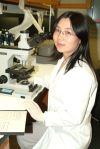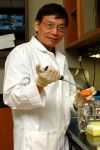Project Title: “Targeting Skeletal Muscle (Fiber Type) for Protection against Diabetes”
PJI: Joshua T. Butcher, PhD, MS – Year 14-15

Joshua T. Butcher, PhD, MS is an Assistant Professor in the Department of Physiological Sciences at the College of Veterinary Medicine at Oklahoma State University. He received a Bachelor’s in Biology from Asbury College, a Master’s in Chemistry from the University of Kentucky, and a Ph.D. in Cellular and Integrative Physiology from West Virginia University. He subsequently completed postdoctoral training at the University of Virginia and the Medical College of Georgia.
Currently, the overall goal of the Butcher laboratory is to improve healthspan in human and animal patients, and specifically we investigate the role of skeletal muscle mass and function in health and disease. Within this paradigm, we alter skeletal muscle (fiber type) in murine models using genetics, pharmaceutics, and nutrition to determine if maintaining healthy skeletal muscle can uncouple cardiometabolic dysfunction, organ-specific pathology, and early mortality in disease. Mechanistically, our disease targets include oxidant stress pathways and focus on the NADPH oxidase isoforms. Ongoing projects include sarcopenic obesity, diabetes, aging, cancer, viral infection, and vascular dementia. The effect of diabetes on skeletal muscle function, as an independent factor, is a topic that has not been explored previously and we believe the potential to be quite high for this work to have a direct clinical impact via identification of novel therapeutic targets using exercise mimetics. Further, this work will also begin to answer some of the fundamental questions on the links between exercise, skeletal muscle, and cardiometabolic health in diabetes.
Project title: “Estrogen Receptor Signaling in B-Cells: A Potential Role in Diabetes Risk after Menopause”
PJI: Marisol Castillo-Castrejon, PhD – Year 14-15

Marisol Castillo-Castrejon, PhD is an Assistant Profesor of Research in the Department of Pathology, the Stephenson Cancer Center and the Harold Hamm Diabetes Center. She received her Bachelor of Science in Nutrition and Food Sciences at Iberoamerican University in Mexico City, and earned a master and PhD in Bilogical Sciences at the National Autonomous University of Mexico School of Medicine. Her graduate work described the immunological cell- mediated microenvironment in the fetal membranes which leads to normal and pathological human labor. Her findings are foundational to disorders affecting pregnant women such as preterm birth, obestity and diabetes. She continued her postdoctoral training in nutritional epidemology and toxicology at University of Michigan Schoold of Public Heatlh, and placental biology at University of Colordato in the Divistion of Reproductive Sciences.
In April 2020, Dr. Castillo-Castrejon joined University of Oklahoma Health Sciences Center joined to establish a research program focused on the role of the immune system in the development of obesity and dysregulated metabolism throughout the lifespan. After menopause, women are at greater risk for age-related diseases such as type 2 diabetes and breast cancer. Weight gain in adult life may be one driver of these risks, as a result of changes in whole body metabolism and inflammation. Dr. Castillo-Castrejon will determine the role of estrogen signaling in the development of immune cells as they infiltrate adipose tissue, and adopt pro-inflammatory phenotypes to influence local and systemic metabolism.
These studies will provide insight into how the immune system interacts with estrogen to influence risk of widespread diseases such as obesity and diabetes. Identification of a window during which weight gain prevention is beneficial could translate to a clinical intervention for many women. As women spend almost 40% of their lives in a postmenopausal state, it is therefore necessary to understand the impact of menopause on risk of metabolic diseases or cancer to improve existing interventions and evidence-based guidelines.
Project Title: “Impact of in utero diabetes exposure on mesenchymal stem cell lineage determination”
PJI: Jeanie Tryggestad, MD - Year 14-15

Jeanie Tryggestad, MD is an associate professor of pediatrics in the section of diabetes/endocrinology at the University of Oklahoma Health Sciences Center and holds the Paula and Ruth Jonas Chair in Diabetes/Endocrinology. She received her Bachelor of Science in Biology from Oklahoma Christian University. She completed her medical school education at the University of Oklahoma Health Sciences Center graduating with distinction. Dr. Tryggestad completed her residency in pediatrics and fellowship in pediatric endocrinology at the University of Oklahoma Health Sciences Center as well. She is board certified in pediatrics as well as pediatric endocrinology.
Dr. Tryggestad’s research interest focus on the impact of maternal diabetes on the future cardiometabolic health of the offspring. She has found that miRNA abundance in circulation is altered by exposure to diabetes in utero, specifically miR-126. The current project will delineate the impact of miR-126 on uMSC differentiation through WNT pathways and identify novel RNA species altered by DM exposure in utero impacting uMSC differentiation to adipocytes. In the future, identifying specific epigenetic modifications that are functionally relevant to MSC lineage preference, and understanding how MSC adipogenesis impacts the relationship between maternal diabetes and infant adiposity in a human cohort would be a significant contribution to the field of developmental programming. These changes could contribute to the propensity for obesity in childhood and perhaps in later life, which has not been investigated in humans.
Project Title: "Are anti-inflammatory dietary bioactive compounds reduced in breastmilk of overweight/obese mothers?"
PJI: Karen Jonscher, PhD – Year 13

Karen R. Jonscher, PhD is an Associate Professor in the Department of Biochemistry and Molecular Biology and the Harold Hamm Diabetes Center. She earned her MS and PhD in Applied Physics from the California Institute of Technology where she worked with Drs. Leroy Hood and John Yates to pioneer novel hardware and software approaches for peptide and protein analysis. Her graduate work contributed to the development of the LCQ ion trap, the first “workhorse” applied to proteomics analyses, and the Sequest algorithm for computer-aided protein analysis. Her postdoctoral studies were conducted with Drs. Natalie Ahn and Katheryn Resing at the University of Colorado Boulder, where she contributed to the development of software that was adopted by Proteome Software to create the Scaffold algorithm. Dr. Jonscher directed a Proteomics Core Facility at the University of Colorado Anschutz Medical Campus for a number of years, then pivoted her career through an NIH K25 Career Development Award to train in metabolism and obesity research under the mentorship of Dr. Jed Friedman. In April of 2019, Dr. Jonscher moved to the University of Oklahoma Health Sciences Center to continue to pursue her collaborative research with Dr. Friedman focused on elucidating mechanisms by which exposure to a poor maternal diet programs the early life immune system in offspring and accelerates risk for nonalcoholic fatty liver disease. Her findings suggest that offspring bone marrow is susceptible to exposure to maternal diet, resulting in metabolic and inflammatory reprogramming of bone marrow-derived macrophages, which is attenuated by the dietary antioxidant pyrroloquinoline quinone (PQQ), a natural compound highly enriched in breastmilk. Her data in obese mice link PQQ’s anti-inflammatory effects with changes in the function of the gut microbiome and rescue of abundance of Lactobacillus, a tryptophan-metabolizing commensal genus. This project extends Dr. Jonscher’s work in mice to the study of anti-inflammatory bacteria-derived metabolites and PQQ in human breastmilk and corresponding inflammatory outcomes in 6 month old infants. Findings from this study will inform design of an interventional trial using dietary supplementation of anti-inflammatory bioactive compounds to modulate obesogenic breastmilk.
Project Title: “Unraveling mechanisms of hypothalamic anorexigenic pathway activation by 17a-estradiol”
PJI: Michael Stout, PhD – Year 12-13

Michael B. Stout, PhD is an Assistant Professor in the Department of Nutritional Sciences. Michael earned his MA degree in Exercise Physiology from the University of Central Florida in 2005 and PhD in Nutrition and Metabolism from Ohio State University in 2011. He then continued his training as a postdoctoral research fellow at Mayo Clinic in the Kogod Center on Aging. The central focus of Dr. Stout’s research program is to understand how metabolic disturbances, such as adipose tissue dysfunction, dyslipidemia, and diabetes can promote the aging process and the onset of multimorbidity. He is particularly interested in the role that sex hormones play in regulating these processes due to gender-specific disparities in metabolic disease, inflammatory disorders, and healthspan across the life-cycle. His long-term goal is to develop therapeutic strategies that target metabolic pathways in a manner similar to calorie restriction thereby diminishing age-related disease and compressing the period of morbidity in mid-to-late life. Dr. Stout’s research related to aging biology is currently funded by the National Institute on Aging, while this project focuses exclusively on obesity and type 2 diabetes.
Project Title: “The Role of Retina Pyruvate Kinase M2 in Diabetic Retinopathy Pathogenesis”
PJI: Yuhong Wang, PhD-Year 12

Yuhong Wang, PhD is a Senior Research Scientist at OUHSC. She received her PhD degree from the Oita Medical University in Japan, and then she was trained in gene therapy in cardiovascular and ocular disease for over ten years. Dr. Wang’s current research focuses on the retinal metabolism, ophthalmic pathology, retinal degeneration and diabetic retinopathy, these studies involved in oxidative stress, inflammation, apoptosis and vasculature in visual and vascular disease. Diabetic retinopathy is a major complication of diabetes mellitus and causes damage to the retinal blood vessels. Currently, there are no therapeutic strategies proven to blunt diabetic retinopathy progression, therefore, innovative approaches to explore the disease mechanisms and develop an effective treatment are imperative. A major goal of Dr. Wang’s study is to demonstrate that hyperglycemia-induced metabolic dysregulation in photoreceptors is a key driver of the oxidative stress /vasculature damage in the development of diabetic retinopathy. She aims to identify specific mechanisms of photoreceptor dysfunction and superoxide generation, and reveal potential therapies that are capable of improving retinal oxidative stress and restoring the functions of the vasculature in the early stages of diabetic retinopathy.
Project Title: "Photoacoustic Imaging of Diabetic Retinopathy"
PJI: Liangzhong (Shawn) Xiang, PhD -Year 11

Liangzhong (Shawn) Xiang, PhD is an Assistant Professor in the Department of Electrical and Computer Engineering, and Stephenson Cancer Center at University of Oklahoma (OU). He was a postdoctoral fellow trained in medical physics at Stanford Medical School before joining OU, and he was awarded the DoD Prostate Cancer Postdoctoral Fellowship at Stanford University (2012-2015). In research, Dr. Xiang and his laboratory was the first to report x-ray-induced acoustic computed tomography (XACT). His research has led to over 60+ peer-reviewed publications, 12 patents, 30+ presentations. Recently, he received the NIH MERIT award (R37), and Research Scholar award from the American Cancer Society. Sponsored by NIH, DoD and Oklahoma state funding agencies with over $4 million active grant support. In education, he received the Nancy L. Mergler Faculty Mentor Award (2017). His students have been awarded SPIE Education Scholarship (2018, 2019), SPIE Travel Scholarship (2016), Trainee Research Prize from the RSNA (2015). In service, Dr. Xiang has served as conference chairs in AAPM annual meeting (2019) and International Conference on Information Optics and Photonics (CIOP 2018), SPIE Student Chapter advisor, associate editor of Medical Physics journal, and grant reviewer for NIH, DOE, Russian Science Foundation (RSF), and Helmholtz Association of German Research Centre
Project Title: "Mechanisms of fetal mitochondrial programming in maternal diabetes: role of AMPK and miR-130b"
PJI: Shaoning Jiang, PhD – Year 11

Shaoning Jiang, PhD is an Assistant Professor in the Department of Pediatrics, section of Endocrinology and Diabetes at the University of Oklahoma Health Science Center (OUHSC). She received her PhD degree from the University of Alabama at Birmingham (UAB) in the department of Pathology, and did a postdoctoral training at UAB in the department of Medicine. Her doctoral and postdoctoral research at UAB involve studies on the molecular mechanisms of insulin resistance, and the interaction between AMP-activated protein kinase (AMPK) signaling and mitochondrial function in inflammatory cells and animal models. Dr. Jiang’s research in the department of pediatrics at OUHSC has been investigating the developmental programming effects of diabetes during pregnancy on placenta and offspring health, and exploring the function of microRNAs and AMPK signaling in developmental programming of mitochondrial biogenesis. With the support provided by CoBRE program, Dr. Jiang generated essential data and established experimental models to further investigate the molecular mechanisms of fetal programming and potential therapeutics. Dr. Jiang’s research is currently funded by OCAST Health Research grant and OK-INBRE research investigator grant
Project Title: “Common novel molecular pathway to prevent diabetes and dementia”
PJI: Ferenc Deak, MD, PhD – Year 10

Ferenc Deak, MD, PhD obtained his medical degree from the Semmelweis Medical School in Budapest, Hungary in 1994. As a graduate student he has trained in the Endocrinology Laboratory of Dr. Andras Spät working on the molecular regulation of hormonal secretion. As a post-doctoral fellow he joined the laboratory of Dr. Thomas Südhof at UT Southwestern in 2000 and developed a rich array of experimental tools, including patch clamp electrophysiology and live fluorescence imaging on virally transduced neurons from genetically engineered mice. Dr. Deak has also developed a model of epileptiform seizures to investigate the effect of possible new therapeutic agents of neuronal network activity. He described a novel effect of fluoxetine on neuronal calcium channels in 2000. These experimental tools allowed him to study the function of synaptic proteins in vesicular exocytosis and endocytosis with high temporal and spatial resolution and results of those studies were published in high-impact peer-reviewed journals including Science, Nature Cell Biology, Neuron and J Neuroscience. Dr. Deak completed his training in translational medicine at the Mayo Clinic, Jacksonville where he focused on neurodegenerative disorders and worked with experts of Alzheimer’s research.
Next, Dr. Deak established his laboratory at the University of Oklahoma, College of Medicine where he works on studies to understand the molecular mechanism of synaptic dysfunction in dementia. Recently, his research explored various causes of cognitive impairment in the elderly. His recent data associate changes in synaptic protein levels with increased risk for dementia and Alzheimer’s disease in the elderly. His current project is to investigate novel molecular regulation leading to synaptic dysfunction and degeneration in diabetic patients. Diabetes mellitus is a raging chronic disorder that reached historic record number of patients resulting from modern lifestyle. It also doubles the risk for dementia and thus deepens the other major health problem of cognitive decline in the elderly in an aging population. He has extensive experience with models of cognitive impairments and up-to-date medical and molecular neuroscience knowledge about endocrinology, synaptic neurotransmission and neuronal communication. His experiments on the munc18-1 KO mice will test the effects of reduced munc18 levels on glucose homeostasis and cognitive function to firmly establish this novel model of diabetic cognitive impairment in the elderly. With the excellent support provided by the HHDC and the CoBRe program, he is conducting innovative research on the etiology of cognitive impairment and diabetes.
Project Title: “Hit to Lead Optimization of a Novel PPARα Agonist towards a Systemically Available Treatment for Diabetic Retinopathy”
PJI: Adam Duerfeldt, PhD – Year 10

Adam Duerfeldt, PhD, was born and raised in central Iowa. He obtained a B.A. in Chemistry in 2006 from Central College in Pella, IA after working under the supervision of James A. Shriver towards the design and synthesis of substituted calix[4]pyrroles as ion sequestration and detection tools. After Central, Adam moved to Lawrence, KS to conduct his doctoral research as a Madison and Lila Self Graduate Fellow under the guidance of Professor Brian S. J. Blagg in the Department of Medicinal Chemistry at The University of Kansas. Adam was awarded the Irsay Dahle Award as the top graduate student in Medicinal Chemistry at KU for his contributions towards the development of new anti-cancer drug leads targeting heat shock protein 90 kDa (Hsp90). After obtaining his Ph.D. in 2011, Adam moved to San Diego, CA to conduct postdoctoral studies in the laboratory of Professor Dale L. Boger at The Scripps Research Institute in La Jolla, CA as an American Cancer Society Postdoctoral Fellow. While in the Boger laboratory Adam completed the total syntheses of (–)-pyrimidoblamic acid and P-3A, two simplified variants of a clinically utilized anti-cancer chemotherapeutic agent, Bleomycin. Additionally, while at Scripps, Adam led Boger group collaborations with Bristol-Myers Squibb and the Dana–Farber Cancer Center, which focused on the preclinical development of novel duocarmycin conjugates.
Dr. Duerfeldt began his independent career as an assistant professor at the University of Oklahoma in August of 2014 and his lab is a constituent of the newly formed Institute for Natural Products Applications and Research Technologies (INPART) within OU’s Department of Chemistry and Biochemistry. The Duerfeldt laboratory engages the interface of synthetic organic/medicinal chemistry and chemical biology to develop chemical probes and therapeutic agents for biological targets implicated in pathogenesis. The lab is a highly collaborative team focused on 1) the development of chemical tools that can be utilized to enhance our understanding of disease mechanisms and 2) the development of new therapeutic leads for the treatment of cancers, bacterial infections, and ocular diseases.
Project Title: “Uncoupling central and peripheral mechanisms of metabolic improvement by 17a-estradiol”
PJI: Michael Stout, PhD – Year 10

Michael B. Stout, PhD is a Senior Research Scientist in the Department of Nutritional Sciences. Michael earned his MA degree in Exercise Physiology from the University of Central Florida in 2005 and PhD in Nutrition and Metabolism from Ohio State University in 2011. He then continued his training as a postdoctoral research fellow at Mayo Clinic in the Kogod Center on Aging. The central focus of Dr. Stout’s research program is to understand how metabolic disturbances, such as adipose tissue dysfunction, dyslipidemia, and diabetes can promote the aging process and the onset of multimorbidity. He is particularly interested in the role that sex hormones play in regulating these processes due to gender-specific disparities in metabolic disease, inflammatory disorders, and healthspan across the life-cycle. His long-term goal is to develop therapeutic strategies that target metabolic pathways in a manner similar to calorie restriction thereby diminishing age-related disease and compressing the period of morbidity in mid-to-late life. Dr. Stout’s research related to aging biology is currently funded by the National Institute on Aging, while this project focuses exclusively on obesity and type 2 diabetes.
Project Title: "Underlying Mechanism of PPARα in Treatment of Diabetic Retinopathy"
PJI: Ying Chen, PhD -Year 4 & 5

Ying Chen, PhD was trained as ophthalmologist and received her Ph.D. from China in Ophthalmology at 2001. She then did post-doctoral studies at the Medical University of South Carolina, the Scripps Research Institute and the University of California at Berkeley. She gained extensive experience in the field of diabetic retinopathy and the aged related macular degeneration. In October of 2003, Dr. Chen joined the section of endocrinology at the University of Oklahoma Health Sciences Center as a postdoctor. She was promoted to research instructor at 2008. She received 3 grants and had over 35 publications in peer reviewed journals.
Project Title: "ER Stress Response and Autophagy in the Onset and Progression of Diabetes"
PJI: Franklin A. Hays, PhD, Mentor: Paul Weigel, PhD, -Year 5

Franklin A. Hays, PhD is an Assistant Professor in the Department of Biochemistry and Molecular Biology at the University of Oklahoma Health Sciences Center. He received his Ph. D. in biochemistry and biophysics from Oregon State University in 2005 in the laboratory of Dr. P. Shing Ho. Following completion of his graduate training Dr. Hays joined Dr. Robert Stroud's group at the University of California in San Francisco (UCSF) to study integral membrane protein structure and function. During this time Dr. Hays was the recipient of multiple postdoctoral fellowships, including a 3-year Ruth L. Kirschstein National Research Service Award from the NIH, and published several papers in top rated journals including Science. Dr. Hays joined the OUHSC faculty in August of 2010 and his laboratory is currently focused on understanding the underlying mechanisms of drug disposition and response in the treatment of human disease. These efforts employ a diverse array of techniques ranging from biophysical, molecular, cellular, and whole animal characterizations. Recently, Dr. Hays has initiated studies aimed at understanding how cells respond to stress within the diabetic state. This stress can be induced from numerous external stimuli, such as high blood glucose concentrations, and illicit an equally broad range of cellular response pathways. Efforts by the Hays laboratory under within this new research direction will be facilitated by interactions with established mentors on the OUHSC campus and within the Harold Hamm Oklahoma Diabetes Center.
Project Title: "Mechanisms of mitochondrial dysfunction in diabetic cardiomyopathy"
PJI: Kenneth M. Humphries, Ph.D. Year 3 & 5

Kenneth M. Humphries, PhD is an Assistant Member at the Oklahoma Medical Research Foundation (OMRF) in the Free Radical Biology and Aging Program, and an adjunct Assistant Professor in the Departments of Biochemistry and Molecular Biology and Geriatric Medicine at the University of Oklahoma Health Science Center. Dr. Humphries received his Ph.D. from Case Western Reserve University in the Department of Physiology and Biophysics. For his graduate work, he characterized an important and novel mechanism of mitochondrial dysfunction induced by lipid peroxidation. This work culminated in two important papers in the journal Biochemistry that, combined, have been cited more than 300 times. Dr. Humphries did his postdoctoral work at the Howard Hughes Medical Institute, University of California San Diego, with Dr. Susan Taylor. He used this training to expand his interest in free radicals beyond their involvement in oxidative damage and into their role in redox regulation. His work at UCSD highlighted a novel aspect of cAMP-dependent protein kinase regulation related mediated by protein thiol redox status. Dr. Humphries’ training and expertise are a natural fit for addressing important questions in the field of diabetes. Specifically, diabetic cardiomyopathy is a serious and deadly complication of diabetes, and understanding how this occurs at the molecular level is critical for future therapeutic treatments and prevention. It is known that diabetes is associated with deficits in mitochondrial function and increased free radical production, but the cause and effect relationship is not well understood. Thus, he is currently focusing on the identifying the diabetes-induces changes that occur to heart mitochondria prior to the onset of cardiac complications. Preliminary work in his laboratory has demonstrated remarkable metabolic pathologies in heart mitochondria using a rodent model of type 1 diabetes. The results of this project will have important implications for understanding the molecular basis of diabetic cardiomyopathy.
Project Title: "VEGF signaling in photoreceptors."
PJI: Yun Z. Le, PhD -Year 4-5

The discovery of vascular endothelial growth factor (VEGF) as a major angiogenic and vascular permeable factor has led to intensive studies on the physiological and pathological role of VEGF in regulating blood-retina barrier (BRB) function. As a result, anti-VEGF agents have become a major therapeutic strategy for BRB dysfunction in diabetic retinopathy (DR) and wet age-related macular degeneration (AMD). However, VEGF may be a survival factor for neurons. VEGF has been recognized as a protective factor in retinal neurons neuronal growth, differentiation, and survival in the central nervous system. While VEGF receptors are present in retinal neurons under normal and diabetic conditions, little is known about the role of VEGF in the survival of these neurons and current literatures are still controversial. As anti-VEGF strategy has become a major strategy for DR, revealing the role of VEGF in retinal neuron survival is paramount to the safety of long-term anti-VEGF treatments. It is known that diabetes induces photoreceptor dysfunction, particularly for cone photoreceptors that are mainly responsible for color and daytime vision. It is also well established that diabetes causes oxidative stress and ischemia that are possible reasons for VEGF up-regulation. Up-regulating VEGF under these stresses may be a survival mechanism for retinal neurons. To test our hypothesis that VEGF signaling plays an important role in photoreceptor survival and function under diabetic or ischemic conditions, we will determine the role and mechanisms of VEGF-signaling in photoreceptor integrity under ischemic and diabetic conditions. In this pilot study, we will perform a variety of biochemical, cellular, pathological, and physiological experiments using in vitro system and rod- or cone-specific VEGF receptor 2 knockout mice. A major goal of this pilot project is to establish animal models and to obtain preliminary data for a competitive NIH project grant application.
Project Title: “Impact of Age and Exercise on Insulin Action”
PJI: Kevin R. Short, PhD - Year 5

Kevin Short, PhD obtained graduate training in human exercise physiology, metabolism and muscle biochemistry at Purdue University and Ball State University. He then completed post-doctoral work in endocrinology, diabetes, and aging at Mayo Clinic, before joining the faculty of the Mayo School of Medicine for four years. At Mayo Dr. Short developed expertise in measuring energy expenditure, protein and glucose metabolism with stable isotope-labeled tracers and tissue biochemistry in humans and animals. In 2006 Dr. Short joined the Department of Pediatrics in the Section of Diabetes and Endocrinology. Dr. Short’s current research examines the impact of exercise on insulin sensitivity and vascular health, particularly in sedentary adolescent children. The goal is to identify the most effective means to prevent or reverse the cardiometabolic risk in children and young adults, thereby limiting a potential lifetime of pathology and medical burden. The team has several years of experience in exercise physiology and has directed exercise training and metabolic outcome studies. Dr. Short and colleagues developed the new Metabolic Research Program, located in the brand new OU Children’s Physicians Building. This program goals and facilities were developed for performing clinical and basic science investigations related to the problem of obesity and diabetes in children and adolescents, with the capacity to conduct exercise testing and training, body composition, vascular function and biological sample analyses. Dr. Short’s CoBRE-supported work has examined how insulin action is affected by a single session of exercise in children versus young and elderly adults, and how different intensities of aerobic exercise training may differentially affect insulin sensitivity and vascular function in overweight sedentary adolescents. New research plans include employing exercise to reduce metabolic risk in people with spinal cord injury and measuring the impact of physical activity on the concentration and turnover of multiple cardiovascular risk proteins in circulation.
Project Title: "Activation of AMPK protests against diabetic vascular complications"
PJI: Zhonglin Xie, MD, PhD Mentor: Ming-Hui Zou, MD, PhD - Year 5

Zhonglin Xie, MD, PhD is an Assistant Professor in the Department of Medicine, Section of Endocrinology, the Oklahoma University Health Sciences Center. He received his PhD in Hokkaido University, Japan, and had an outstanding postdoctoral research experience in Boston University and University of Tennessee, during this period he was supported by a postdoctoral fellowship from the American Heart Association. Dr. Xie is very productive with over 40 publications, including 12 since 2001 in high impact journals such as Circulation, Circulation Research, Diabetes, J Biol Chem, and Hypertension. He has made the important discovery that protein kinase C- zeta regulates LKB1-AMPK cascade by increased LKB1 phosphorylation at Ser 428 and Ser 307, the latter being a newly identified phosphorylated site. His expertise in molecular biology and physiology will be applied to independent studies on the mechanisms by which AMPK activation protects against cardiovascular complications in diabetes. His studies will yield novel information of how AMPK is regulated in diabetes and if AMPK is a therapeutic target in preventing or delaying cardiovascular complications in diabetes.
Project Title: "Anti-autonomic receptor antibodies in diabetic orthostatic hypotension"
PJI: Xichun Yu, MD: -Year 4

Xichun Yu, MD's current research focuses on the pathological roles of receptor-activating autoantibodies in cardiovascular diseases including hypertension, cardiomyopathy, metabolic syndrome and atrial fibrillation associated with hyperthyroidism. This pilot study examines the association of anti-autonomic receptor antibodies with orthostatic hypotension and characterizes the functional activity and impact of these antibodies. Orthostatic hypotension is often associated with diabetes and has many causes. It causes falls and injury, impaired quality of life and complicates concurrent medication use. These consequences are exaggerated in the diabetic patient and lead to patient and physician frustration because the therapeutic options have side effects and are frequently ineffective. There has been no significant breakthrough in understanding the etiology of orthostatic hypotension over the last 15 years. Dr. Yu, who works closely with Dr. David Kem, and his group are the first to look for and identify the presence of functionally active autoantibodies to the autonomic receptors in diabetic patients complicated by orthostatic hypotension. These autoantibodies produce a vasodilatory effect in vitro, suggesting that they may contribute to the pathogenesis and increased frequency of orthostatic hypotension associated with diabetes. Although the antibodies are unlikely the sole cause, they are important co-culprits in the complex cardiovascular pathophysiology of orthostatic hypotension. Data from this study will help identify therapeutic strategies that target these antibodies and also establish a priority for NIH funding for research on this clinical association.